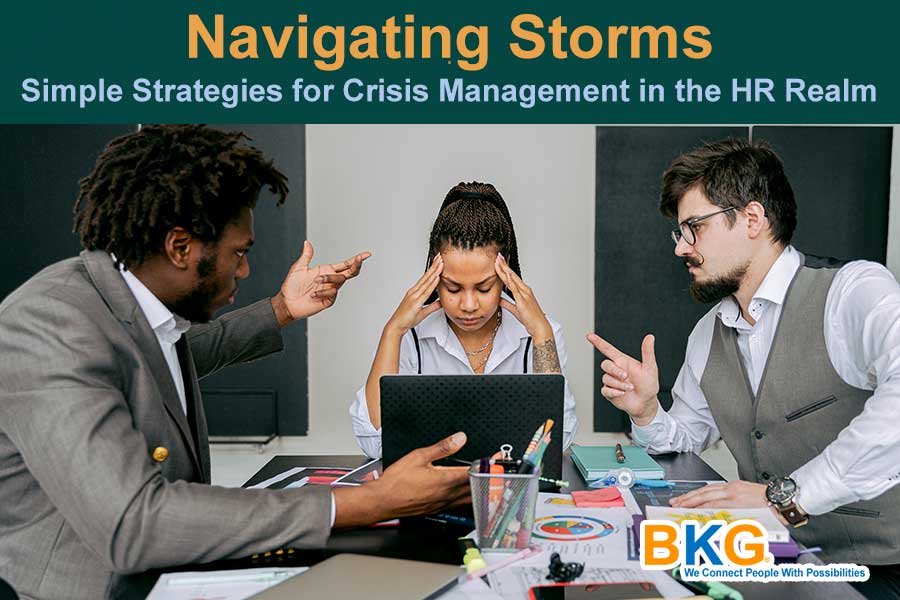
Greetings, navigators of workplace challenges! In today’s guide, we steer through the unpredictable waters of crisis management with our blog, “Navigating Storms: Simple Strategies for Crisis Management in the HR Realm.” Join us as we unravel uncomplicated approaches for HR professionals to effectively manage crises, using the lessons learned from navigating the turbulent tides of events like the COVID-19 pandemic.
Introduction
Crisis management is like sailing through a storm – it requires a steady hand, clear communication, and a well-prepared crew. In this blog, we explore simple yet effective strategies for HR professionals to navigate through workplace crises, drawing insights from experiences such as the COVID-19 pandemic. Let’s set sail into the heart of crisis management simplicity.
Understanding the HR Role in Crisis Management
A. Clear Communication as the Compass
Embark on a journey into the importance of clear communication during crises. This section highlights how HR professionals play a vital role in ensuring that communication is transparent, timely, and easily understood. Discover how a well-communicated plan becomes the guiding compass for both employees and the organization during turbulent times.
B. Employee Well-being as the North Star
Delve into the concept of prioritizing employee well-being as the North Star in crisis management. This section explores how HR professionals can lead efforts to support the physical and mental health of employees. Discover simple yet impactful initiatives that contribute to a workplace environment where employees feel cared for and supported.
Simple Strategies for Crisis Management in the Workplace
A. Flexible Work Arrangements as a Lifeboat
Explore the concept of flexible work arrangements as a lifeboat in times of crisis. This section delves into how HR professionals can implement adaptable work structures to accommodate the changing needs of employees. Discover the benefits of offering flexibility as a way to navigate the uncertainties that crises bring.
B. Transparent Policies as Anchors of Stability
Delve into the importance of transparent policies as anchors of stability during crises. This section explores how HR professionals can simplify policies and ensure that employees are well-informed about expectations and support mechanisms. Discover the impact of clear policies in fostering a sense of stability and predictability.
Learnings from the COVID-19 Pandemic Experience
A. Remote Work Lessons: Embracing the Virtual Voyage
Embark on a reflection of lessons learned from the COVID-19 pandemic, with a focus on remote work. This section illustrates how HR professionals can distill insights from the sudden shift to remote work and integrate them into future crisis management plans. Discover the positive aspects that emerged from the virtual voyage.
B. Employee Support Initiatives: Building Resilience
Delve into the initiatives that supported employees during the COVID-19 pandemic, contributing to their resilience. This section explores simple yet effective programs implemented by HR professionals, from mental health resources to virtual team-building activities. Discover how these initiatives built a sense of community and support.
Preparedness for Future Storms: Simple HR Practices
A. Regular Training Drills as Safety Nets
Explore the concept of regular training drills as safety nets in crisis management. This section delves into how HR professionals can conduct simple, periodic drills to ensure that employees are familiar with crisis response protocols. Discover the value of preparedness in mitigating the impact of unforeseen events.
B. Open Channels for Employee Feedback as Compass Adjustments
Delve into the importance of open channels for employee feedback as compass adjustments during crises. This section explores how HR professionals can establish simple yet effective mechanisms for gathering insights from employees. Discover how these adjustments contribute to a more responsive crisis management strategy.
Conclusion: Guiding the Ship Through Calm and Storm
As we conclude this exploration, envision a workplace where HR professionals are the steady hands guiding the ship through calm seas and storms alike. Crisis management, in its simplicity, is about clear communication, employee well-being, and adaptable strategies. By embracing these straightforward principles, HR professionals become the navigators that guide the ship to safety and stability, even in the midst of uncertainty.
